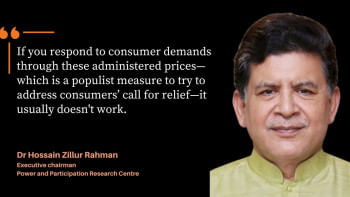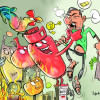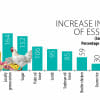Essentials getting further out of reach

Ordinary people seem to be caught in an unrelenting cycle of rising prices for essential goods. Various reports have recently highlighted the continued rise in the prices of essentials, especially food, causing immense hardship for low- and fixed-income households but also shocks for many who expected a change. Evidently, events of the past few months—the mass uprising and political changeover in July-August, followed by unprecedented rainfall and flash floods in August-September—have had significant impacts on the production and supply of most food staples. However, there are indications of artificial price inflation as well.
Reportedly, vegetable prices have risen by Tk 20-40 per kg, while broiler chicken now costs Tk 20 more. The price of a dozen brown eggs has surged by Tk 15, with a total increase of Tk 20-25 per dozen in just three weeks (as of October 5). Prices of green chilies have skyrocketed by Tk 60 in just one week. Soybean oil prices have gone up by Tk 5-10, and palm oil by Tk 15. While extreme weather and global factors have undoubtedly affected production and supply chains, they don't fully explain the scale of these price hikes.
Reports also suggest the involvement of market syndication. Large corporate entities are allegedly controlling the market as always, manipulating the prices of essentials—a familiar situation from the tenure of the previous government which did little to break the syndicates. But their continued operation now has prompted many to ask: what is the current administration doing about it?
Since taking office on August 8, the interim government has initiated several key reform initiatives across different sectors. However, there have been no significant measures aimed at controlling the kitchen market and providing some relief to struggling citizens. While steps such as making onions and potatoes duty-free did help lower their prices, and attempts were made to fix the prices of eggs and chicken, these efforts have largely been ineffective. On Monday, Youth and Sports Adviser Asif Mahmud announced the imminent formation of a task force to monitor markets and rein in the soaring prices of essentials. While this is a welcome step, much more needs to be done. With people's purchasing power remaining generally stagnant, any further increase or instability in prices will only deepen the burden on already vulnerable households.
The interim government, therefore, must prioritise a comprehensive plan to address the price issue. This may include temporary initiatives such as increasing the imports of essential items and making more items duty-free to increase their supply, and also reducing fuel prices so that the transportation cost drops. But more importantly, the administration must make it a priority to free the market of the influence of syndicates and extortion so that there is zero scope for manipulating the prices.

 For all latest news, follow The Daily Star's Google News channel.
For all latest news, follow The Daily Star's Google News channel. 










Comments